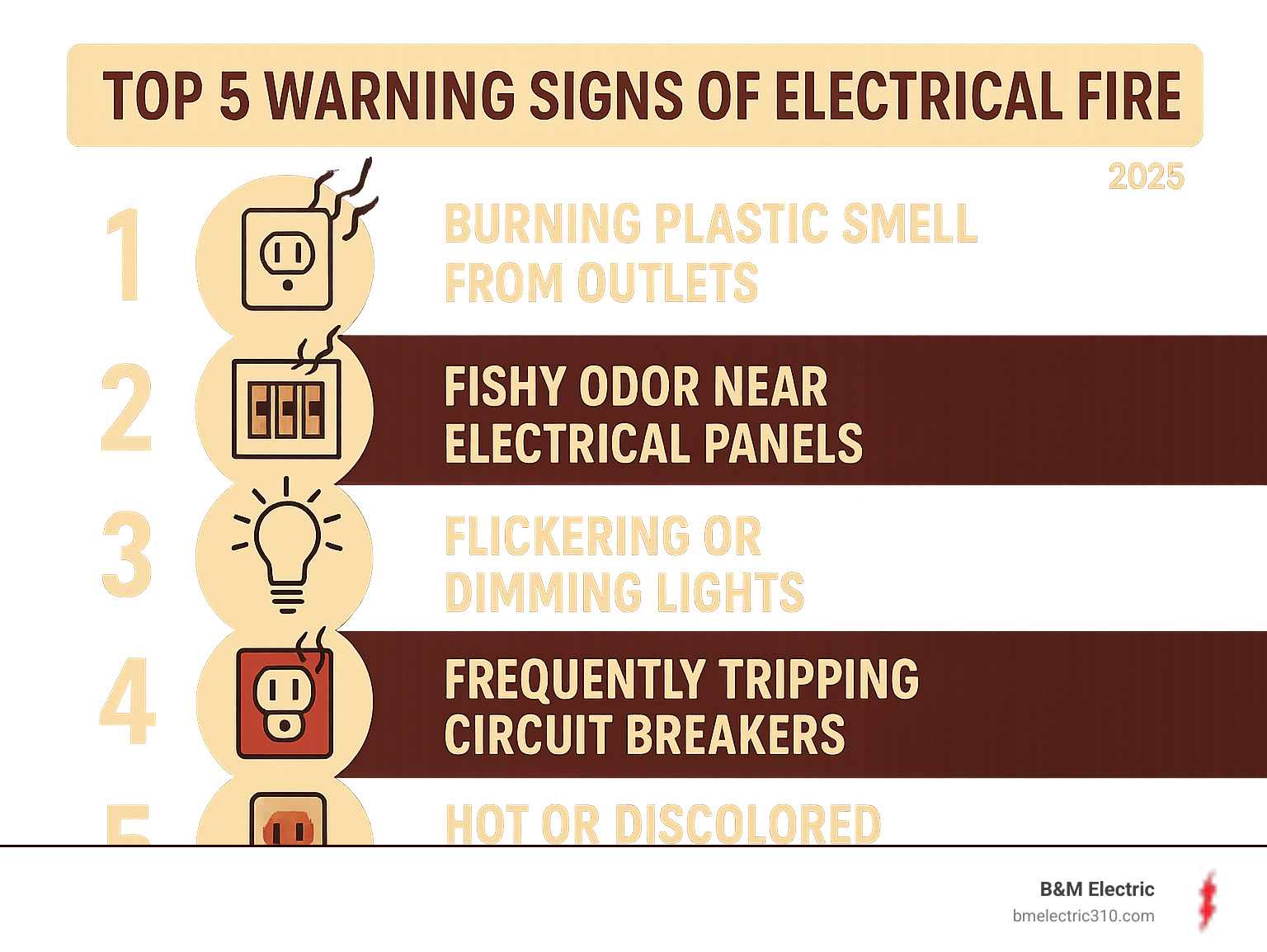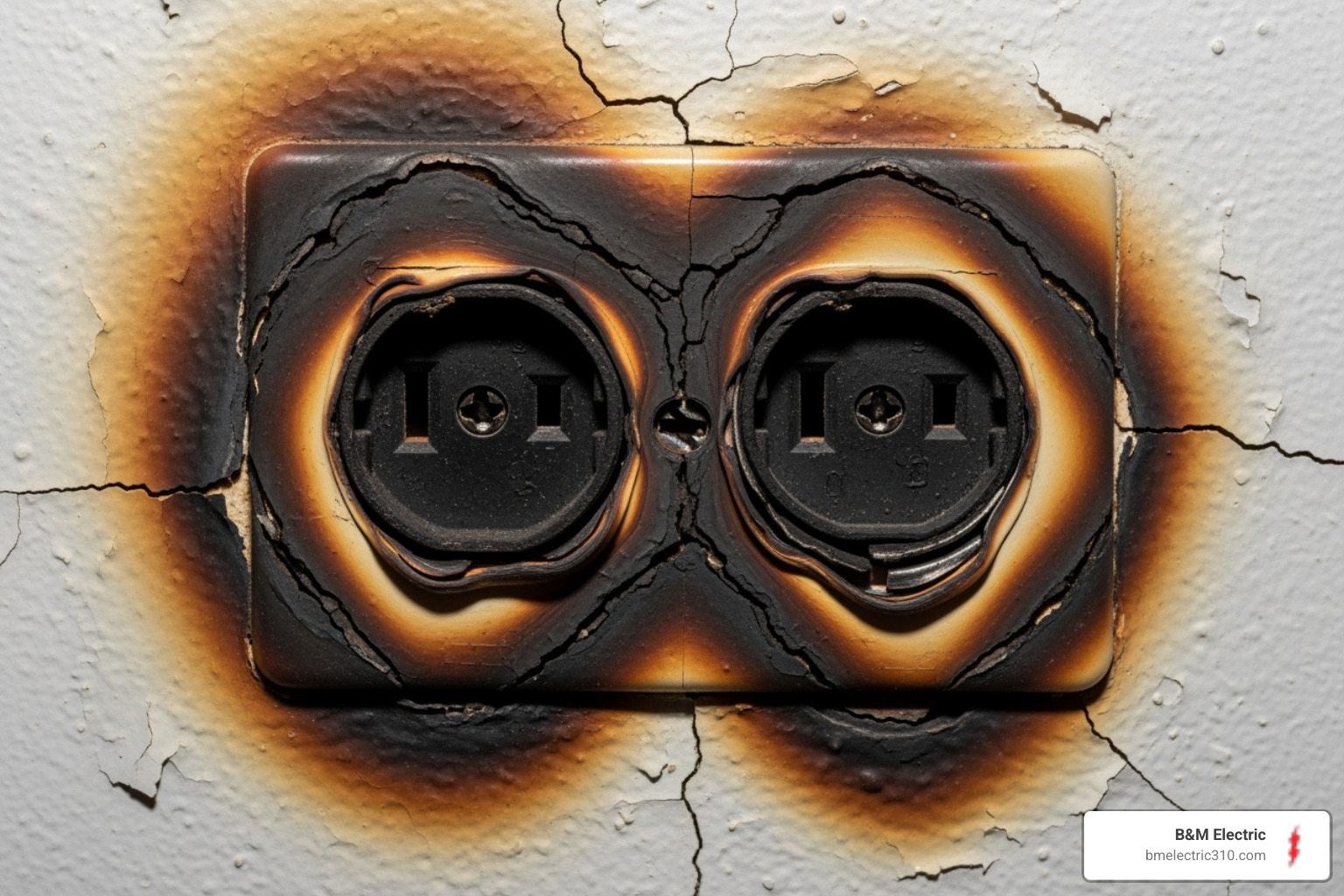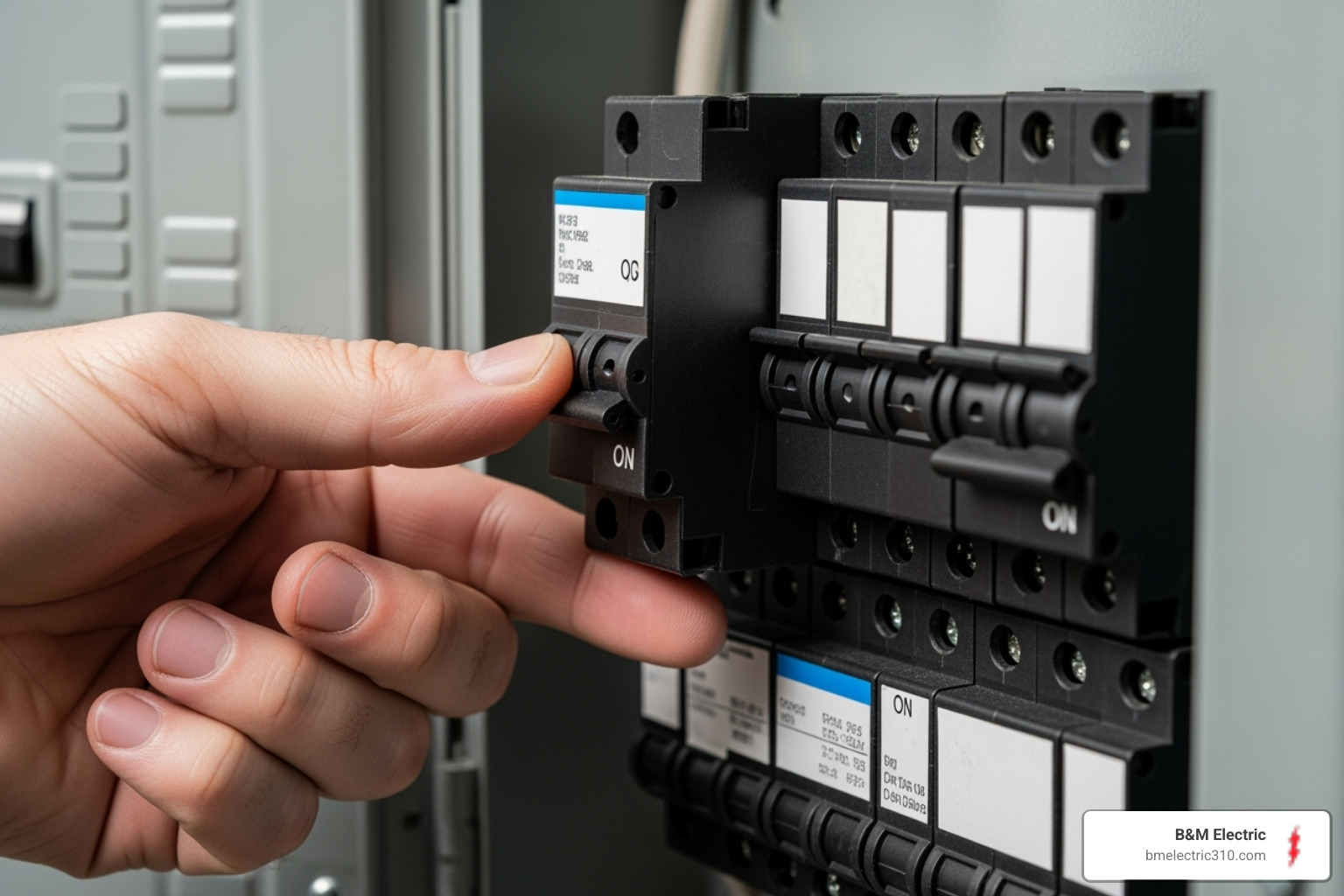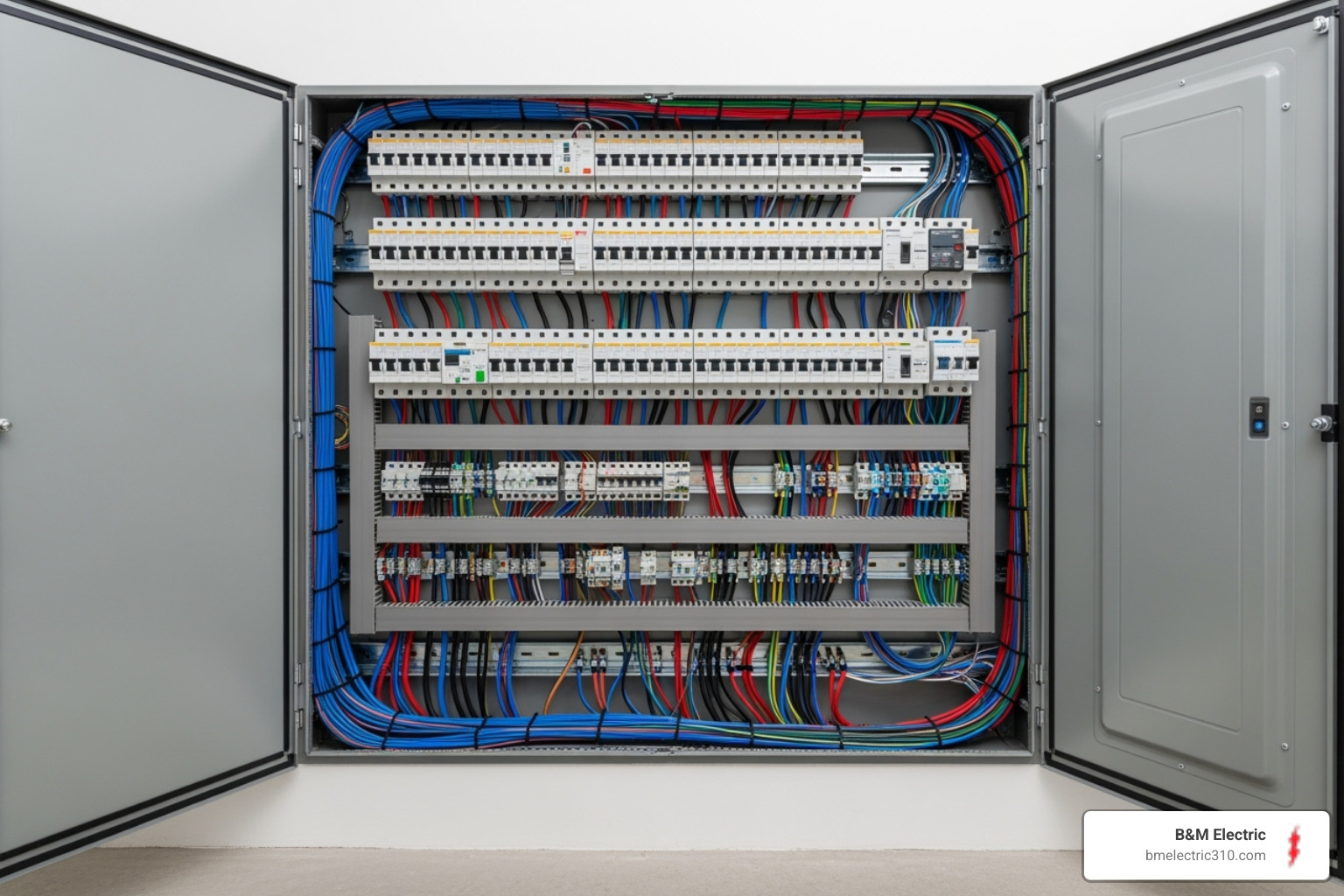Don’t Get Shocked: Decoding the Electrical Burning Smell Mystery
By B&M ElectricAugust 28, 2025
Electrical Burning Smell: 5 Urgent Safety Warnings
Recognizing the Warning Signs of Electrical Fire Hazards
An electrical burning smell is one of the most urgent warning signs your home can give you – and it demands immediate attention. This distinctive odor, often described as burning plastic, rubber, or even a fishy scent, signals that electrical components are overheating and potentially creating a fire hazard.
Quick identification guide for electrical burning smells:
- Burning plastic/rubber smell – Wire insulation melting from overheated circuits
- Fishy odor – Overheating electrical components before they ignite
- Chemical/pungent smell – PVC insulation releasing toxic fumes
- Metallic burning – Electrical arcing or sparking in connections
Don’t wait to investigate. Electrical fires account for an estimated 51,000 home fires each year, resulting in approximately 470 deaths and over $750 million in property damage annually.
The smell itself can appear without visible smoke or flames, making it your first and most critical warning. Unlike other household odors, an electrical burning smell indicates active overheating that could escalate to a full fire in as little as 30 seconds.
Whether you’re dealing with faulty wiring, overloaded circuits, or aging electrical systems, recognizing these warning signs early can save your property and potentially your life.
What Causes an Electrical Burning Smell and Other Warning Signs?
That unmistakable electrical burning smell wafting through your home isn’t just unpleasant—it’s your electrical system crying out for help. When electrical components start overheating, they literally begin cooking themselves and everything around them, creating those alarming odors that make you stop in your tracks.
Think of it like this: electricity flowing through your wires is a lot like water flowing through pipes. When there’s a problem, things get backed up, pressure builds, and heat starts generating where it shouldn’t. That heat becomes intense enough to melt plastic insulation, scorch outlet materials, or even burn dust that’s accumulated over time.
Faulty wiring tops the list of culprits, especially in older homes that have seen decades of use. Wires that were installed 40+ years ago weren’t designed to handle today’s power-hungry appliances—your smartphone chargers, big-screen TVs, and kitchen gadgets. When wiring gets damaged, deteriorated, or was improperly installed in the first place, it creates resistance that generates dangerous heat.
Overloaded circuits are another major player in the burning smell game. Picture plugging your space heater, microwave, and hair dryer into the same circuit. That’s like asking a garden hose to handle the flow of a fire hydrant—something’s got to give, and it’s usually your wiring that pays the price with excessive heat buildup.
Old appliances can turn from faithful servants into fire hazards seemingly overnight. That trusty toaster that’s been with you for 15 years might develop worn-out heating elements or frayed internal wiring. Even newer appliances can have defective parts that overheat. While a slight “new appliance” smell might be normal initially, any persistent or strong burning odor is waving a red flag.
Loose connections might sound minor, but they’re actually one of the most common causes of that dreaded electrical burning smell. Inside outlets, switches, and junction boxes, wires that aren’t properly secured create resistance points that generate localized heat. It’s like having a kink in your garden hose, but instead of reducing water flow, you’re creating a hot spot that could ignite.
Your home’s electrical system is constantly communicating with you through various warning signs beyond just smell. Flickering lights often signal overloaded circuits or loose wiring—especially when they dim every time you turn on the microwave or vacuum cleaner. Those buzzing or crackling sounds coming from outlets or your electrical panel? That’s the sound of electricity arcing between loose connections, creating both heat and noise.
Tripping circuit breakers deserve special attention. While they’re designed to protect you by shutting off power when there’s trouble, frequent trips mean your system is consistently drawing too much power or has developed a fault. Think of circuit breakers as the safety guards of your electrical system—when they keep blowing the whistle, you need to listen.
Watch out for hot outlets or switch plates too. A slightly warm switch might be normal, but anything that feels genuinely hot to the touch indicates serious overheating within the electrical box. And if you notice any discoloration around sockets—scorching, charring, or blackened areas—that’s evidence that excessive heat has already been doing damage.
Here’s a sobering fact: electrical fires cause 13% of house fires, and they account for the largest share of property damage in commercial buildings. This isn’t about minor inconvenience—we’re talking about serious risks to life and property that demand immediate attention.
Decoding the Specific Types of Electrical Burning Smell
Not all electrical burning smells are created equal, and the specific odor you’re detecting can actually provide clues about what’s going wrong. Your nose is essentially becoming a diagnostic tool for your electrical system.
That fishy smell might have you checking the kitchen, but if there’s no seafood in sight, your electrical system could be the culprit. This strange, almost urine-like odor is surprisingly common when electrical components start overheating, particularly in older systems. The smell comes from the breakdown of heat-resistant chemicals and insulation materials that were commonly used decades ago. If you smell fish but know there isn’t any around, it’s time to investigate your electrical system.
The classic burning plastic or rubber smell is probably what most people associate with electrical problems. This acrid, unmistakable odor typically means wire insulation is literally melting from excessive heat. As wires get hotter than they’re designed to handle, their protective plastic or rubber coating begins degrading and releasing that sharp, chemical smell.
A pungent chemical odor often indicates PVC insulation fumes. Most modern electrical wiring uses PVC (polyvinyl chloride) insulation, and when this material starts smoldering or burning, it releases strong chemical fumes. The smell can range from sharp and acrid to something resembling sewer gas, depending on how far the burning has progressed.
Each of these smells represents electrical components actively degrading under heat—a clear sign that you’re dealing with a serious fire risk that needs immediate attention.
Other Sensory Clues to Electrical Problems
While your nose often provides the first warning of electrical trouble, your eyes and ears can pick up on critical signs too. In our 50 years serving Torrance and the South Bay, we’ve learned that homeowners who pay attention to these sensory clues catch problems before they become disasters.
Dimming lights when you flip on other appliances suggest your circuits are struggling to handle the electrical load. Intermittent power that comes and goes points to loose connections or faulty wiring that’s making inconsistent contact. Sparks from outlets deserve immediate attention—while tiny sparks might be normal when plugging something in, large, continuous, or blue sparks indicate serious problems like short circuits.
Keep an eye out for switches that feel hot to the touch—they should never be uncomfortably warm. Discoloration around sockets tells the story of overheating that’s already occurred, showing up as charring, blackening, or melted areas on outlets, switches, or wall plates.
Your ears can be just as valuable as your eyes and nose. Buzzing, humming, or crackling sounds from electrical fixtures often signal loose wiring or dangerous electrical arcing happening behind your walls. These aren’t sounds you want to ignore—they’re your electrical system’s way of telling you that something needs professional attention right away.
Your Immediate Action Plan: What to Do When You Smell Burning
When that unmistakable electrical burning smell hits your nose, your heart might skip a beat – and that’s completely normal. But here’s the thing: staying calm and knowing exactly what to do can make all the difference between a minor electrical issue and a devastating house fire.
The most important thing to remember? Safety always comes first. Don’t try to be a hero – electrical problems can escalate incredibly quickly, sometimes in less than a minute. Take a deep breath, and let’s walk through this together.
Your first job is to locate the source of that smell, but do it smart. Don’t go sticking your nose right up to outlets or appliances. Instead, move methodically through your home, checking each room while staying alert for other warning signs like sparks, smoke, or unusual sounds.
Immediate Steps for an Electrical Burning Smell
The moment you detect that electrical burning smell, here’s your step-by-step action plan:
Turn off the power at your breaker box – this is your most crucial move. Head to your electrical panel and flip the circuit breaker for the area where you smell burning. Can’t figure out which breaker controls that area? No worries – when in doubt, flip the main breaker to cut power to your entire home. It’s better to sit in the dark for a while than risk a fire.
Unplug any appliances if you can do so safely. If you suspect a specific device is the culprit and you can reach it without putting yourself in danger, disconnect it from the wall. But here’s the key word: safely. Don’t touch anything that’s hot, sparking, or looks damaged.
Get some fresh air flowing by opening windows and doors. This helps clear out any toxic fumes and gives overheated components a chance to cool down. Those burning plastic fumes aren’t just unpleasant – they can be harmful to breathe.
Never, ever use water on anything electrical. We can’t stress this enough! Water and electricity are a deadly combination. If you have a fire extinguisher, make sure it’s rated for electrical fires (look for “Class C” or “ABC” on the label).
If you see smoke or flames, get out immediately. Don’t try to investigate further, don’t grab valuables, just get everyone (including your pets) out of the house and call 911 from a safe distance.
When to Call the Fire Department vs. an Electrician
Knowing who to call can be confusing when you’re stressed, so let’s break it down clearly.
Call 911 right now if you see any visible smoke or flames, no matter how small they seem. Even a tiny electrical fire can explode into a major blaze in seconds. Also call immediately if you’re seeing large, bright sparks or continuous arcing, or if that electrical burning smell is so overwhelming it makes you feel sick or dizzy.
When the smell is strong and persistent even after you’ve turned off the power and opened windows, that’s another 911 situation. And honestly? If you’re standing there thinking “I’m not sure if this is an emergency,” then it probably is. Emergency responders would much rather check out a false alarm than respond to a house fire.
Call a licensed electrician (like our experienced team at B&M Electric) when you’ve got the situation stabilized but something’s clearly wrong. Maybe the electrical burning smell lingers even though there’s no visible fire. Perhaps a circuit breaker keeps tripping every time you reset it, even after unplugging everything on that circuit.
Sometimes you’ll smell that telltale burning odor but can’t figure out where it’s coming from. That’s where our 50 years of experience serving Torrance and the South Bay really comes in handy. We have specialized tools that can detect problems hidden inside walls or behind appliances that you’d never find on your own.
If you’re noticing other warning signs alongside the smell – flickering lights, buzzing sounds from outlets, or switch plates that feel hot to the touch – that’s definitely a job for a professional electrician, not the fire department.
Electrical problems rarely fix themselves. Even if the smell goes away temporarily, the underlying issue is probably still there, just waiting to cause trouble again.
How to Prevent Electrical Fires and Keep Your Home Safe
The best time to deal with an electrical burning smell is before it ever happens. Think of electrical fire prevention like brushing your teeth – a little daily attention prevents much bigger problems down the road.
At B&M Electric, we’ve spent 50 years helping South Bay families keep their homes safe, and we’ve learned that most electrical fires are completely preventable. The key is staying ahead of problems rather than reacting to them.
Your home’s electrical system works hard every day, powering everything from your morning coffee maker to your evening TV shows. Just like any hardworking system, it needs regular care and attention to stay safe and reliable.
Regular inspections are your first line of defense. We recommend having a licensed electrician check your system every 3-5 years, or sooner if your home is older than 40 years. During these visits, we can spot potential trouble spots before they become dangerous.
Upgrading old systems is especially important for older homes. If your house still has the original wiring from decades ago, it’s like asking a horse-drawn carriage to keep up on the freeway. Modern homes use far more electricity than homes from the 1970s and 80s, and old wiring simply wasn’t designed for today’s demands.
Outlet safety might seem basic, but it’s where many problems start. Overloaded outlets are one of the leading causes of that dreaded electrical burning smell. Your outlets aren’t meant to power half your house through a single power strip.
Appliance maintenance is often overlooked, but aging appliances with worn-out motors or frayed cords can quickly become fire hazards. When your trusty old toaster starts making strange noises or your hair dryer cord looks like it’s been through a war, it’s time to say goodbye.
Are the Fumes From an Electrical Fire Toxic?
Here’s something that might surprise you: yes, the fumes from an electrical fire are absolutely toxic. This isn’t just about the unpleasant smell – we’re talking about genuinely dangerous chemicals that can harm your health.
When electrical components burn, they don’t just disappear into harmless smoke. Burning plastics release harmful chemicals including aldehyde gases and other respiratory irritants that can damage your lungs and throat.
The plastic insulation around wires contains materials that become toxic when heated. PVC insulation fumes can include chlorine gas and other chemicals that are particularly dangerous in enclosed spaces. Even small amounts can cause breathing problems, especially for children, elderly people, or anyone with respiratory conditions.
Smoke inhalation risks from electrical fires are serious business. The particulate matter in the smoke can damage your cardiovascular system and lungs. In fact, smoke inhalation causes more fire-related deaths than burns do.
This is exactly why we always tell our Torrance neighbors to evacuate immediately if they see smoke or smell something strong and chemical-like. It’s not worth risking your health to investigate. Ventilation after an incident is crucial – open those windows and doors to clear the air completely before spending extended time in the area.
Long-Term Prevention Checklist
Preventing that electrical burning smell from ever appearing in your home comes down to building good electrical habits. Think of these as your electrical safety routine – simple steps that become second nature over time.
Avoid overloading outlets by spreading your electrical load around your home. That power strip under your desk shouldn’t look like an octopus with tentacles reaching everywhere. If you’re constantly searching for available outlets, it might be time to have additional circuits installed.
Use surge protectors for your valuable electronics, but remember they’re not magic boxes that can handle unlimited power. They protect against voltage spikes, not circuit overloads. Don’t daisy-chain them together or plug high-power appliances like space heaters into them.
Replace frayed cords as soon as you notice any damage. We’ve seen too many close calls from people who thought they could nurse a damaged cord along for “just a little longer.” Electrical tape isn’t a permanent solution – it’s a temporary bandage at best.
Schedule professional electrical inspections regularly, especially if you live in an older home. We can spot problems that aren’t visible to the untrained eye, like loose connections hiding behind outlet covers or circuits that are quietly overloading.
Upgrade outdated wiring in homes over 40 years old. This is especially important if you still have aluminum wiring, knob-and-tube systems, or old fuse boxes. These systems weren’t designed for modern electrical demands, and upgrading them is one of the best investments you can make in your home’s safety.
Modern safety devices like AFCI and GFCI breakers add extra layers of protection that older homes simply don’t have. These smart devices can detect dangerous electrical conditions and shut off power before problems escalate.
The bottom line? A little prevention now saves you from potentially devastating problems later. And if you ever do catch that electrical burning smell, you’ll know exactly what to do – and you’ll have our number ready to call.
Frequently Asked Questions about Electrical Fire Risks
Over our 50 years serving Torrance and the South Bay, we’ve answered countless questions about electrical safety. These are the ones that keep homeowners up at night – and rightfully so.
How quickly can an electrical fire spread?
Here’s the scary truth: electrical fires move very rapidly. What makes them particularly dangerous is that they often start hidden inside your walls or within appliances, silently building heat until they break free.
Once an electrical fire becomes visible, you have precious little time. A small electrical fire can become a major blaze in under a minute. Within five minutes, your entire house can be engulfed in flames. The heat buildup is intense – we’re talking temperatures reaching 1,100°F in just three and a half minutes.
This is exactly why we stress immediate action when you detect that electrical burning smell. It’s not just an inconvenience you can deal with later – it’s your early warning system giving you a head start before things get dangerous.
The hidden nature of electrical fires makes them especially treacherous. By the time you see smoke or flames, the fire has likely been building strength inside your walls for some time. That’s when flashover can occur – the moment when everything in a room suddenly ignites simultaneously.
What are the dangers of ignoring a burning smell?
Ignoring an electrical burning smell is like ignoring a smoke detector – except the smoke detector might malfunction, but your nose rarely does. The risks pile up quickly when you brush off these warning signs.
Property damage tops the list of consequences. Electrical fires cause over $750 million in property damage every year. What starts as a “small problem” can destroy your home and everything you’ve worked for. We’ve seen families lose decades of memories and possessions because they waited too long to address warning signs.
Toxic fume exposure is another serious concern that many people don’t consider. Those unpleasant chemical smells aren’t just offensive – they’re actively harmful to your health. Burning electrical components release dangerous gases that can cause respiratory problems, headaches, and long-term health issues with continued exposure.
The electrocution risk increases dramatically when electrical components are overheating. Faulty wiring that’s hot enough to create burning smells is also dangerous to touch. We’ve seen homeowners get seriously injured trying to investigate electrical problems without proper safety precautions.
Most devastating of all is the potential for a full house fire. Electrical fires account for approximately 470 deaths annually. These aren’t just statistics – they represent families torn apart by preventable tragedies.
The cost of a professional electrical inspection is nothing compared to losing your home, your health, or worse.
Can I still use an outlet if the burning smell goes away?
Absolutely not – and this is one of the most dangerous misconceptions we encounter. Just because an electrical burning smell disappears doesn’t mean the problem has fixed itself. Electrical systems don’t heal like a cut on your finger.
Think of it this way: if your car engine started smoking but then stopped, would you keep driving? Of course not. The same logic applies to your electrical system. That underlying fault – whether it’s loose wiring, an overloaded circuit, or a failing component – is still there, waiting to cause problems again.
Intermittent problems are often the most dangerous because they lull you into a false sense of security. The smell might come and go based on electrical load, temperature, or other factors, but each time it returns, the damage gets worse.
Using a compromised outlet is like playing electrical roulette. Every time you plug something in, you’re risking a recurrence that could be more severe than the first incident. The degraded wiring or components will continue to deteriorate with use, increasing both the fire risk and the eventual repair costs.
Professional inspection is always required after any burning smell, even if it seems to resolve on its own. We have specialized tools to detect heat damage, measure electrical loads, and identify problems that aren’t visible to the naked eye. Don’t gamble with your family’s safety – if you’ve smelled burning, something needs attention from a qualified electrician.
Secure Your Home with a Professional Electrical Inspection
When you notice an electrical burning smell in your home, you’ve received one of the most important warnings your house can give you. This isn’t just an inconvenience or a minor annoyance – it’s a serious safety signal that requires immediate professional attention.
Think of it this way: your electrical system is like the nervous system of your home. When it starts sending distress signals through burning odors, flickering lights, or hot outlets, ignoring these warnings is like ignoring chest pains and hoping they’ll go away on their own.
Never ignore an electrical burning smell. The statistics we’ve shared throughout this article aren’t meant to scare you, but they do paint a clear picture. With electrical fires causing over $750 million in property damage annually and claiming hundreds of lives, the stakes are simply too high to take chances with DIY fixes or the “wait and see” approach.
Safety must always be your top priority. Whether you’re dealing with a subtle fishy odor from an overheating component or the sharp smell of melting wire insulation, these odors indicate that electrical components are breaking down under dangerous heat levels. The longer you wait, the higher the risk becomes.
At B&M Electric, we understand that electrical emergencies can feel overwhelming. That’s exactly why we’ve dedicated five decades to serving the Torrance, CA, and South Bay communities with dependable service and a personal touch. Our team doesn’t just show up to fix problems – we take the time to explain what’s happening, why it’s happening, and how we can prevent it from happening again.
Professional diagnosis makes all the difference. Our licensed electricians have the specialized tools and expertise to safely identify hidden electrical faults that might be causing that concerning smell. We can pinpoint problems within walls, behind appliances, or in your electrical panel that would be impossible for homeowners to detect on their own.
When you choose B&M Electric, you’re not just getting a quick fix. You’re investing in precision, care, and long-term safety for your family and property. We believe that even stressful situations like electrical emergencies can be handled with professionalism and an approach that puts you at ease.
Don’t let curiosity turn into catastrophe, and don’t let a small electrical issue become a devastating fire. When you need peace of mind and expert electrical care, we’re here to help with the same commitment to excellence that has served our community for 50 years.



